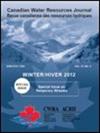75 years of Canada-US transborder water quantity hydropolitics
IF 0.9
4区 环境科学与生态学
Q3 WATER RESOURCES
引用次数: 0
Abstract
AbstractThis paper reviews the history and evolution of Canada-United States transboundary water quantity politics (hydroelectricity, canals, irrigation, etc.) over the last 75 years: megaprojects on the St. Lawrence, Niagara, and Columbia Rivers during the early Cold War, a wide variety of transborder water issues stretching from coast to coast during the latter half of the twentieth century, and then recent hydropolitics concerning diversions from the Great Lakes basin. Utilizing an environmental history approach, and drawing from other fields such as historical geography, water policy, and political ecology, I show that Canada and the United States cooperatively manipulated border water environments on a large scale. Despite this coordination, there was often significant political and diplomatic controversy. I argue that coordinating or dealing with the United States deeply influenced the development of hydroelectricity in Canada, as well as the related hydraulic engineering expertise and technology. Moreover, transborder water politics also influenced many aspects of Canadian economic and political development, including federal-provincial relations. I explore themes such as Canada as a hydro state, the role of the Boundary Waters Treaty and the International Joint Commission, and concepts such as hydraulic nationalism and hydraulic imperialism.Keywords: Transboundary water politicsCanada-US relationswater diplomacyhydroelectricitywater quantity Disclosure statementNo potential conflict of interest was reported by the author.75年的加拿大-美国跨境水量水文政治
摘要本文回顾了近75年来加拿大-美国跨界水量政治(水电、运河、灌溉等)的历史和演变:冷战初期圣劳伦斯河、尼亚加拉河和哥伦比亚河的大型工程,20世纪下半叶从海岸到海岸的各种跨界水问题,以及最近有关大湖流域改道的水文政治。利用环境史方法,并从历史地理学、水政策和政治生态学等其他领域借鉴,我表明加拿大和美国合作大规模地操纵了边境水环境。尽管有这种协调,但经常有重大的政治和外交争议。我认为,与美国的协调或打交道深深影响了加拿大水力发电的发展,以及相关的水利工程专业知识和技术。此外,跨界水政治还影响了加拿大经济和政治发展的许多方面,包括联邦与省的关系。我探索的主题包括加拿大作为一个水力国家,边界水域条约和国际联合委员会的作用,以及水力民族主义和水力帝国主义等概念。关键词:跨界水政治加美关系水外交水电水量披露声明作者未报告潜在利益冲突。
本文章由计算机程序翻译,如有差异,请以英文原文为准。
求助全文
约1分钟内获得全文
求助全文
来源期刊

Canadian Water Resources Journal
WATER RESOURCES-
CiteScore
2.90
自引率
5.90%
发文量
17
审稿时长
>12 weeks
期刊介绍:
The Canadian Water Resources Journal accepts manuscripts in English or French and publishes abstracts in both official languages. Preference is given to manuscripts focusing on science and policy aspects of Canadian water management. Specifically, manuscripts should stimulate public awareness and understanding of Canada''s water resources, encourage recognition of the high priority of water as a resource, and provide new or increased knowledge on some aspect of Canada''s water.
The Canadian Water Resources Journal was first published in the fall of 1976 and it has grown in stature to be recognized as a quality and important publication in the water resources field.
 求助内容:
求助内容: 应助结果提醒方式:
应助结果提醒方式:


